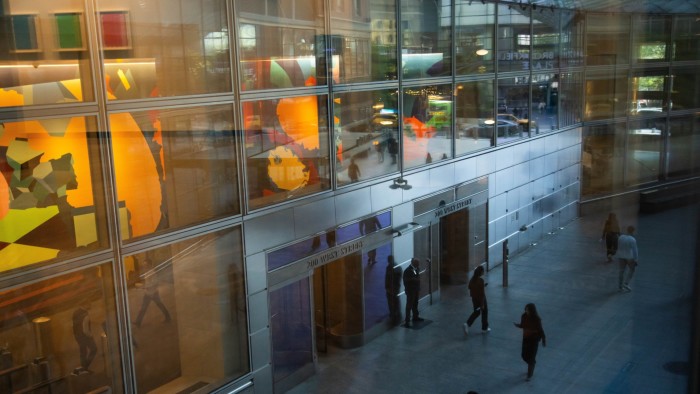Unlock the Editor’s Digest for free
Roula Khalaf, Editor of the FT, selects her favourite stories in this weekly newsletter.
Goldman Sachs chief executive David Solomon expressed optimism the Trump administration would heed warnings from corporate America that a tit-for-tat trade war could threaten the global economy, as the White House embarks on sweeping trade negotiations.
Solomon said uncertainty about growth and “fears over the potentially escalating effects of a trade war” had “created material risks to the US and global economy”.
While the pause by US President Donald Trump of a portion of his planned tariffs was encouraging, Solomon cautioned that chief executives and big investors had been hamstrung by policy uncertainty and there were growing signs of an economic slowdown.
“We are hopeful that feedback from companies, large and small, institutional investors and, ultimately, consumers will support an approach that will lead to greater economic certainty and long-term growth,” Solomon said on Monday.
The comments to analysts came as the Wall Street bank reported first-quarter results boosted by the market volatility that has accompanied Trump’s return to office.
Goldman’s equities traders on Monday reported their best quarter on record, helping the bank to deliver net income of $4.7bn, up 15 per cent from a year ago and ahead of analysts’ estimates for $4.3bn.
Trading — and equities in particular — was the standout performer in the quarter, making Goldman the latest Wall Street bank to report strong gains in business following JPMorgan Chase and Morgan Stanley on Friday.
Equities revenues were 27 per cent higher than a year ago, at $4.2bn. Revenues from the bank’s fixed income, currencies and commodities division were only 2 per cent higher, at $4.4bn.
The increases highlight why banks were keen to preserve their trading divisions despite years of weak returns following the 2008 financial crisis.

The business struggled as a result of a stricter regulatory regime, which made proprietary trading much more difficult, as well as rock-bottom interest rates that muted market volatility.
But trading has returned to the fore as the Trump administration’s abrupt policy moves have sparked a frenzy in markets.
“It’s been a long road to get back to where they were,” said Jason Goldberg, banking analyst at Barclays.
“The US banks have all stuck with it and retooled and restructured. It certainly has benefited them in the last several years as interest rates and volatility have increased.”

Although some volatility is beneficial to banks’ trading units, too much uncertainty can lead to markets seizing up.
Volatility has also curtailed investment banking. Investment banking fees at Goldman fell 8 per cent to $1.9bn. The number of new deals unveiled since the start of January is the lowest in more than a decade.
Solomon said “the volatile backdrop led to more muted activity relative to the levels we had expected coming into the year” and that the bank’s ability to complete deals in its pipeline would depend on market conditions.
Goldman shares were up about 2 per cent in morning trading in New York.


